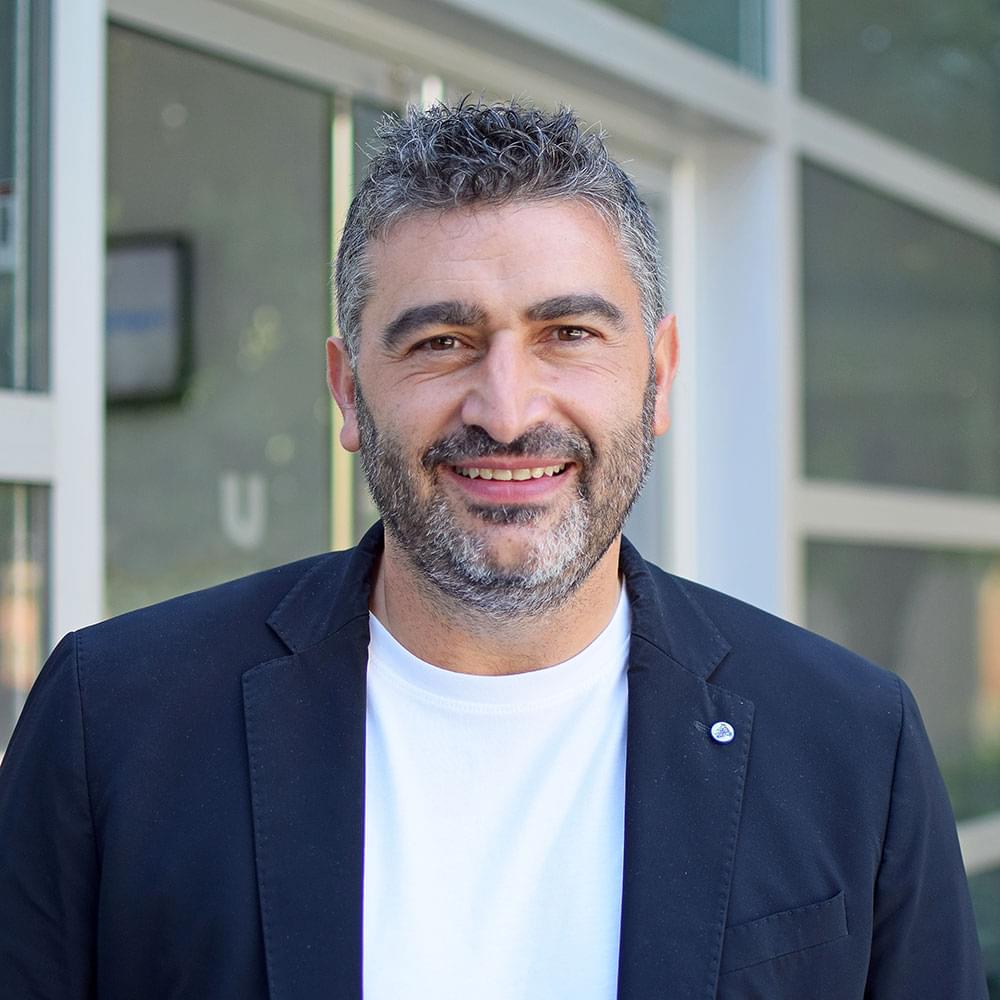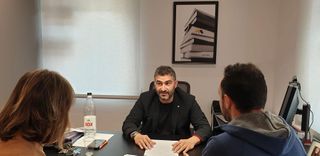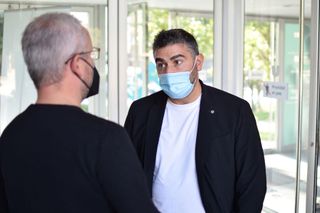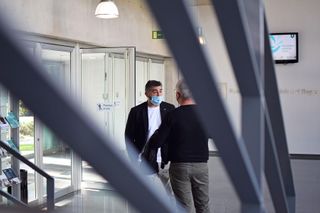
Dani Mauriz Vidal (Barcelona, 1973) was in the first class to take the diploma in Business Sciences at the Bages University Foundation – UManresa (1997). He has a master’s degree in Business Administration from UVic-UCC and, since 2020, a degree in Business Administration and Management from the Faculty of Social Sciences in Manresa.
He runs the Escola Montserrat, a school in Sant Vicenç de Castellet that offers intermediate and advanced vocational training in the fields of business, education and care. Although he wanted to be a journalist, the family business ended up captivating him and he has been responsible for increasing the size of a school that, when he took over in 2000, had 6 employees and 27 students, and now employs 36 people and trains nearly 300 students a year.
Why did you decide to study Business?
I actually wanted to be a journalist, but I couldn’t get on a course because of my grades. It was a huge frustration for me. At home we decided I should study Business Sciences because it was a very cross-disciplinary degree and provided several job options. I started the course without vocation, but I realized that I love management, relations with people, problem solving, developing projects and business communication. I'm not attracted to the financial and accounting part – in fact, at the school, it's an area I have delegated – but I’m passionate about everything to do with communication, marketing and business strategy.
«I started the course without vocation, but I realized that I love management, relations with people, problem solving, developing projects and business communication.»
And why at Manresa?
When I studied Business, it was basically due to proximity, and when I chose to homologate the degree, it was because I knew the teachers and I valued the institution’s close, friendly approach. This boosted my confidence and feeling of security. For me, the human factor is crucial. I have tried distance learning and it is not for me. Knowing who you’re talking to when you send an email and getting a quick response is very valuable to me.
«I think the more simulation you do in university, the better, because the learning is more efficient and enriching»

What elements differentiated your business training at UManresa?
Without any doubt, the use of simulation as a teaching and learning methodology. Our simulation exercises in the Business Administration and Management degree were a great way to get closer to the reality of everyday business. I think the more simulation you do in university, the better, because the learning is more efficient and enriching. Another differentiating element was direct contact with real experiences of entrepreneurs, visiting business projects in the territory and getting to know them from a practical perspective.
With this business training, how did you end up in the world of education?
I studied without any intention of dedicating myself to the family business, the Escola Montserrat, which my grandparents founded. I didn’t want to know anything about it, but when I finished studying Business, while I was looking for a job, I started working as an administrator at the school and also taught some classes. In the year 2000, my father fell ill and died. The school, which taught early childhood, primary and secondary at the time, was doing very badly. I was asked to take my father’s place temporarily, for a year, until the end of the school year, with the prospect of closing the school after that. And 22 years have passed since then!
In the early years we were a very small team of six people trying to keep the project going, but without looking beyond the day to day. One day I realized that we needed a change of perspective. I went to an educational marketing conference and I came into contact with a new world linked to innovation and change in the sector. I saw that we needed to go outside the four walls of the school building and with the head of studies we started working and spreading information about the school on social media, first on Facebook and Twitter, and then on the rest of networks. As the movie ad says, “If they don’t know you, you don’t exist,” and so we had to make ourselves known while we were working on the marketing strategy, which is very important to me. Good commercial attention can make the difference so that a person from Gelida decides to come and study at your school in Sant Vicenç de Castellet.
«Yes, I am very aware that it is vital for everyone to constantly update their knowledge. I could take the UVic-UCC MBA close to home and with amazing teachers, in terms of their knowledge and experience. I would do it again because for me it represented a dose of knowledge that I would not otherwise have been able to acquire»

The diploma and bachelor’s degree weren’t enough for you so you took the UVic-UCC MBA ...
Yes, I am very aware that it is vital for everyone to constantly update their knowledge. I could take the UVic-UCC MBA close to home and with amazing teachers, in terms of their knowledge and experience. We were a group of fifteen students who networked a lot with each other. In fact, we still keep in touch and some of us have even collaborated on joint projects. I would recommend that everyone trains and updates their knowledge, especially in the business sector. I would do it again because for me it represented a dose of knowledge that I would not otherwise have been able to acquire. I always tell my students that training doesn’t have to end in school and that it’s important to have a good network, be open to the world and not to stay with the same four old friends.
«Some of the measures included in the new management project of the Escola Montserrat are the result of learning acquired in the Business Administration and Management and MBA classes, as a management by objectives project»
Did studying help you in your day-to-day work?
The lessons I learned in the university have been very helpful to me in strategically planning my business. Some of the measures in the new management project I have developed are the result of lessons learned in the Business Administration and Management and MBA classes, as a management by objectives project that incorporates extra pay for professionals who meet common and specific strategic objectives. It is now a pilot test and I think it is a very innovative, unusual initiative in the field of education.
In your opinion, what is the main challenge of training?
We must ensure that the training we provide for students is as close as possible to what they will find in companies. We need to train active people in the classrooms, who learn by doing. It’s not about what the teacher teaches but what the student learns. The fact that students incorporate the knowledge and skills they will need in a real work environment is what motivates them, and this is an essential change throughout the education system. Learning by memory is useful for some things, but other key skills are needed that we must work on in training centres.
Have you ended up discovering your true vocation?
Yes, over time I have grown to love my work. I love planning what we want the school to be like in the coming years and changing what is needed to keep moving forward. However, I have not completely given up my journalistic vocation and by combining both passions I have written a book in which I talk about educational marketing and summarise my experience at the helm of the school. I wrote it in just over five afternoons and I think it might be useful. Now it needs revising, because I wrote it very quickly before the pandemic, but there are always urgent matters that are more of a priority and there it is, next to the computer, in printed format and pending publication. In addition, my experience in educational marketing has been recognized on two occasions with a State Award for the Best Social Media Strategy and the Award for Leading Professional in Educational Marketing, given by Marketing and Schools.

What has it been like to run a vocational training centre during the pandemic?
It has been hard and difficult, because it was a completely unknown and uncertain situation. Managing a school from home, without seeing anyone and trying to make it work normally, was very complicated, both professionally and emotionally. Luckily the teachers were highly dedicated and the students responded very well. Digitally, we weren’t ready, but within three days of starting the full lockdown we were already running 100% online. It required a lot of effort, because we had to learn everything fast.
The pandemic has had two sides. It has helped us to see that we have the tools to teach in a different way, that 100% face-to-face is not always necessary. We’ve discovered some of the benefits, such as online meetings between teaching staff that avoid mobility and have environmental benefits in return. But moving fully online also made both teachers and students realize that training cannot be detached from socialization and that this socialization is non-existent behind a computer screen. Face-to-face experience is very rich and contributes a lot.
Do you still have some kind of relationship with the university?
Yes, I feel at home at the university. I know a lot of people and I come here often. In fact, we have things in common: we are all dedicated to training people. In addition, the Escola Montserrat has a dual training agreement with the university and some of our students complete training periods there. I also like to plan collaboration projects, like the ones we have with other training organizations like FEDAC.
How do you see yourself in the future?
I want to continue learning and training in all the fields that are useful to me to make decisions more consistently. My goal is to consolidate the school and do this in collaboration with other entities and institutions. The world is progressing towards collaboration. You can't always do everything alone.